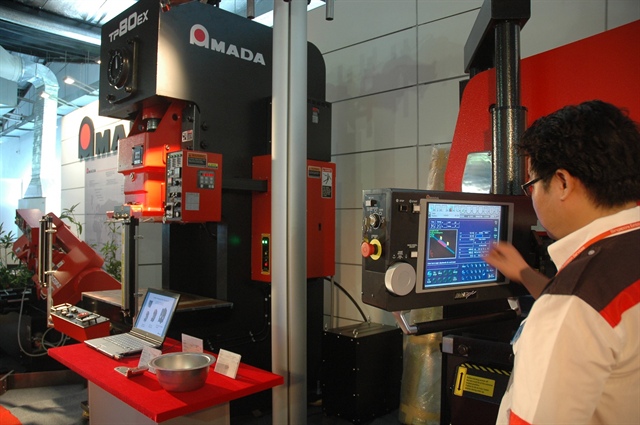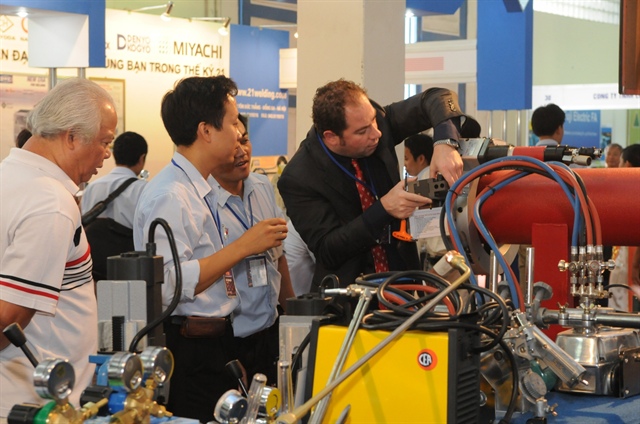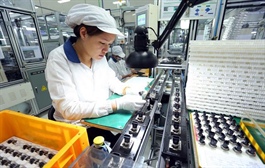EU trade deal makes Vietnam more attractive to German investors
EU trade deal makes Vietnam more attractive to German investors
The EU-Vietnam Free Trade Agreement (EVFTA) not only helps increase the competitiveness of German businesses in Vietnam but also makes Vietnam more attractive to German investors.
Confidence among German enterprises
A survey conducted by the network of German Chambers of Commerce Abroad (AHKs) indicated that German enterprises operating in Vietnam are optimistic about the country’s economic growth, with almost 93 percent of the surveyed saying they will continue to invest in Vietnam and more than 64 percent expecting their business to develop better in the next 12 months. Vietnam’s political stability and high quality human resources in technical, transportation, logistics and other industries are among the factors generating confidence among German enterprises.
|
According to the AHKs, more than 73 percent of surveyed German businesses believe that the EVFTA’s implementation helps increase their competitiveness in Vietnam and makes Vietnam become a more attractive supply market.
Robin Hoenig, Divisional Head for Trade Policies (Asia/ASEAN), said Vietnam is one of the two countries in the Association of Southeast Asian Nations (ASEAN) along with Singapore that have free trade agreements with Europe. The EVFTA, specifically, is a high-quality agreement, which not only provides tariff reduction but also relates to non-tariff factors, such as opening of input goods markets, regulatory requirements for state-owned enterprises and/or e-commerce and sustainable development.
European investment growth
According to the assessment of Vietnam’s Ministry of Planning and Investment, the EVFTA provides an impetus to investment in Vietnam. As of September 2021, Vietnam attracted 2,242 effective investment projects with a total registered capital of US$22.24 billion from 26 EU countries (up 164 projects and US$483 million from the same period in 2020), accounting for 5.58 and 6.57 percent of foreign investment capital and projects in Vietnam.

EU investment is mainly found in high-tech industries |
The Netherlands ranked first with 382 projects worth US$10.36 billion (accounting for 46.5 percent of all EU investment capital in Vietnam), followed by France with 632 projects worth US$3.62 billion (16.25 percent), and Germany with 405 projects worth US$2.25 billion (10.13 percent). In the first five months of 2022, Vietnam attracted 422 effective German investment projects worth US$2.31 billion.
Vu Van Chung, Deputy Director of the Ministry of Planning and Investment’s Foreign Investment Agency, said Europe had invested US$22 billion in Vietnam in the first year after EVFTA went into effect in August 2020.
According to the Ministry of Planning and Investment, EU investment is mainly found in high-tech industries and more recently in post and telecommunications, finance, office leasing, retail, clean energy, support industry, food processing, high-tech agriculture, and pharmaceutical industries. EU investment including German investment is expected to increase significantly with major high-quality projects in the medium and long term.
EU investors in general and German businesses in particular say Vietnam needs to further improve its capacity, technology, and the quality of human resources, especially labor forces capable of operating modern machinery, and strengthen dialogue with the business community in order to develop appropriate policies and enhance its investment environment.
| The AHK World Business Outlook (WBO) is based on a regular DIHK (the Association of German Chambers of Commerce and Industry) survey of member companies of the German Chambers of Commerce Abroad. It collected feedback in March and April this year from more than 4,200 German companies, branches and subsidiaries worldwide, as well as companies with close ties to Germany. AHK WBO is seen as a barometer of the confidence among German companies and as a key indicator of the German business situation and business expectations for Vietnamese economic development. |























